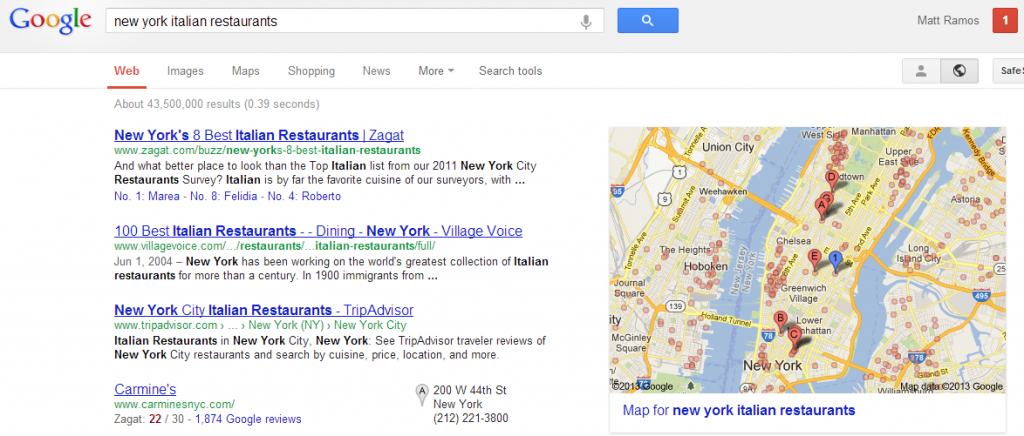I’ve often wondered what police officers think about when they pull a car over for speeding. Perhaps they’re hoping they haven’t come across some idiot that will pull a gun on them, or someone who’s high and unpredictable. Maybe they’re hoping she’s not a screamer, or hoping he’ll be reasonable and cooperative. At some point, they’ve probably thought of all of those.
I sometimes wonder if the relief of finding a decently-dressed, well-groomed businessperson with their hands in plain sight and an understanding face shocks them out of writing a ticket.
Of all the horrible, negligent, even malicious drivers on the road, this obviously isn’t one of them. The officer feels he can trust this one to make good driving decisions in the future, and maybe pay attention to the speedometer. There’s no way this infraction was malicious.
Google has been the self-appointed internet police force for years now. They do their best to catch and filter out spam from their results. Sometimes spam websites get through their net. That’s to be expected. No police force catches every speeder. Besides, that’s not the subject of this article. What I’m most interested in right now is what happens after Google catches you.
When Google finds something that reeks of spam – whether it be links from irrelevant sites, paid linking networks, keyword stuffing, or anything less than white-hat – it has a choice to make. Google will do one of 3 things.
1. Penalize the site. Make it rank much lower that they would have without their black-hat SEO.
2. Sit on it – wait, gather data, and perhaps implement one major takedown at a later date – like they’ve done to some major linking networks recently.
3. Trust that the site had good intentions, or it wasn’t their fault. Remove the benefit from that spam, without “penalizing” the site per say – just try not to count that link or ignore the stuffed keyword.
(There’s a fourth option, but it’s almost too frightening to mention – Google could de-index the entire site, but this is not likely for any white- or grey-hat.)
At this point, the deciding factor is how much Google trusts you. You’ve been caught. Are you going to get the ticket?
Here are some of the things Google seems to pay attention to at this point:
1. Are you a brand in Google’s eyes?
2. If so, how big / active / often mentioned online are you?
3. What is your domain authority? (How many overall, high-quality, and diverse links do you have to your site?)
4. What is the domain age? (Spamming websites don’t normally survive 10 years.)
5. How serious or widespread is the infraction?
Google’s algorithm normally has a high amount of trust for well established brands and websites. (Of course, bad national press can sometimes force Google to manually penalize your site.) New sites using less-than-relevant and spammy linking tactics are very likely to be penalized while authoritative brand websites using the same tactics will cause Google to attempt to ignore them.
In fact, a little bit of black-hat link building can actually help large brands. If it’s not widespread, Google is unlikely to penalize the site. Although Google’s spam filters may neutralize the effect of 95% of those illegitimate links, the other 5% will help the site.
After saying that, I want to tell you that I don’t recommend these black-hat SEO strategies. As Google’s algorithm is able to filter this out more and more, you’ll receive less and less value from these tactics. White-hat strategies increase in value over time. You’ll find a much better ROI in legitimate link building and quality content creation than in anything that could potentially cause your customers to mistrust you. It is important, though, for a white-hat SEO to be able to explain to their clients why competitors are succeeding in the short term using what you’ve refused to do.
A good first step in any SEO effort is getting the website recognized as a brand in Google and improving the domain authority. That way, you’ll be able to push much harder without coming under Google’s scrutiny. No one likes getting a speeding ticket – so most SEOs’ job security is directly correlated with domain authority.



Well said. The black-hat stuff sure does work. That’s why people still do it. But eventually, this year or next, it will bite you in the butt. Better to build your brand and grow your tribe by delivering value. What? SEO is about helping real people?
Can you please detail some strategy to be seen as a brand in Google’s eye?
Citations are a large part of it – although they’re mainly thought about in relationship to local search. Just mentions of your company online gives search engines a good idea of who’s a company and how big a splash they’ve made in the marketplace.